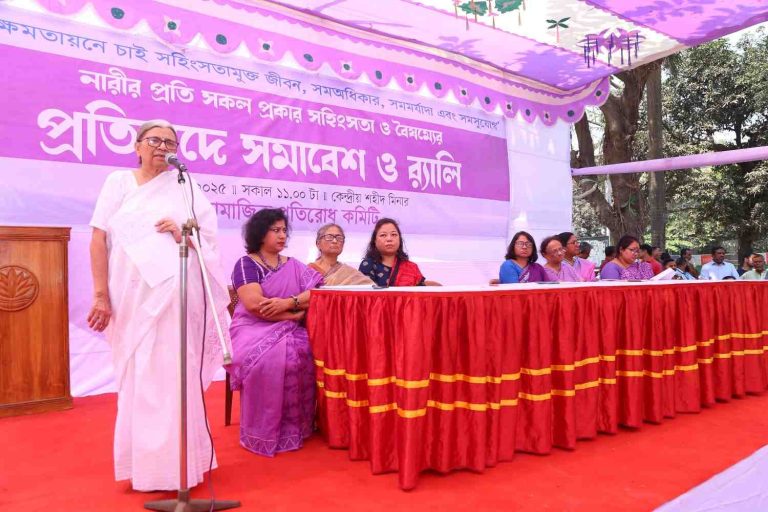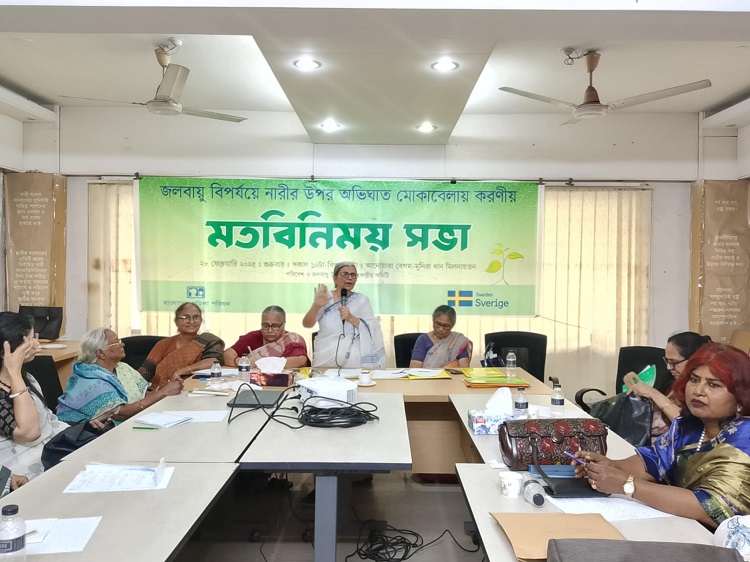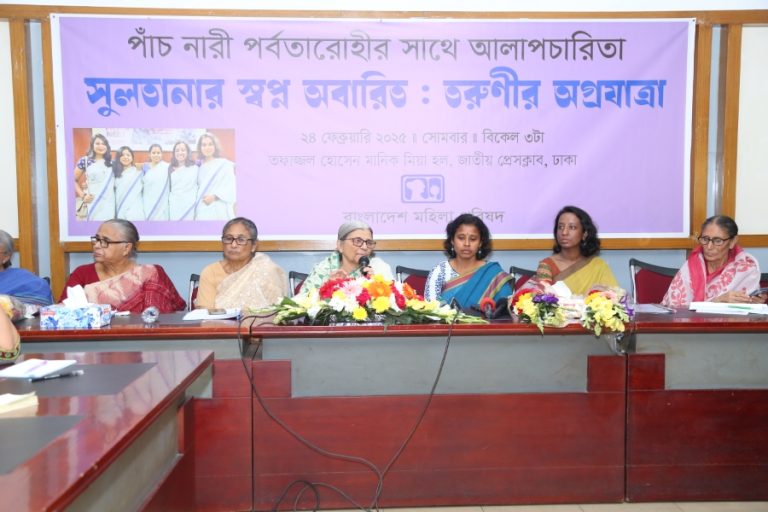The 54th founding anniversary of the Bangladesh Mahila Parishad (BMP) was celebrated on Tuesday, April 2, 2024, at 11:00 AM at the Sufia Kamal Bhavan, Anwara Begum- Sufia Khan Auditorium (10, B/1, Segunbagicha, Dhaka). The event, held under the theme “Confronting Discrimination, Fostering Equality Awareness,” was chaired by Dr. Fauzia Moslem, President of BMP.
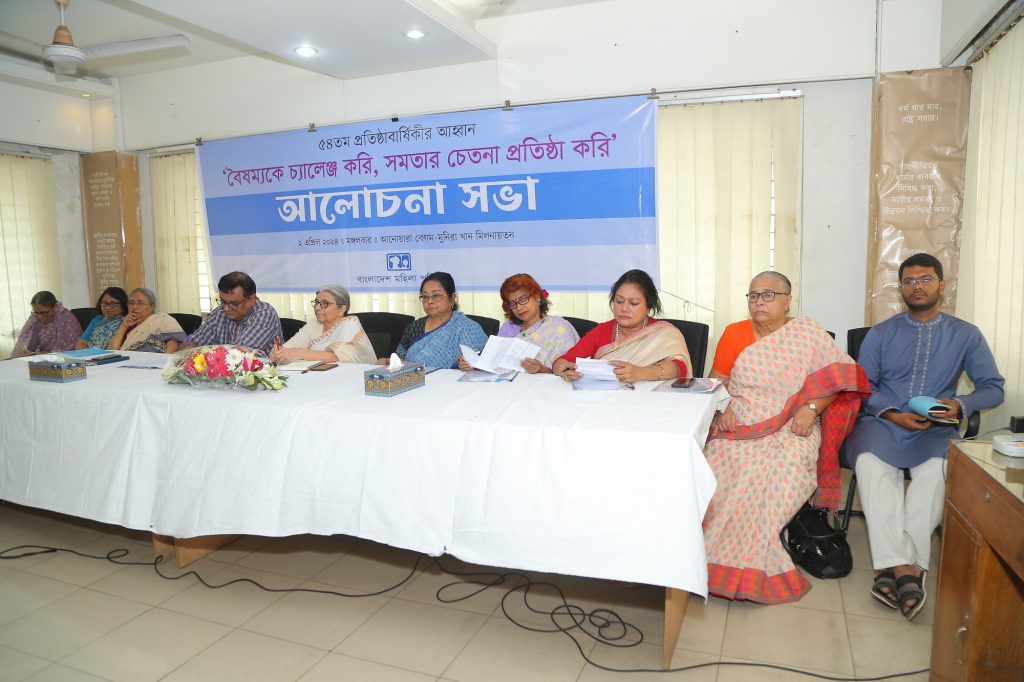
The session commenced with a welcome address by Maleka Banu, General Secretary of BMP, followed by the reading of the declaration by Shima Moslem, the Joint General Secretary of BMP.
Distinguished speakers present at the event included Dr. Nasim Akhtar Hussain, Professor of Government and Politics at Jahangirnagar University; Dr. Shayla Nasrin, former vice chairman and professor of Begum Badrunnesa Government Women’s College; Advocate Salma Ali, President of the Bangladesh National Women Lawyers’ Association (BNWLA) ; Syed Ishtiaq Reza, CEO of Global Television; Shahanaaz Sumi, Director of Bangladesh Nari Progoti Sangha; and Adnan Mustari, General Editor of Dhaka University Debating Society.
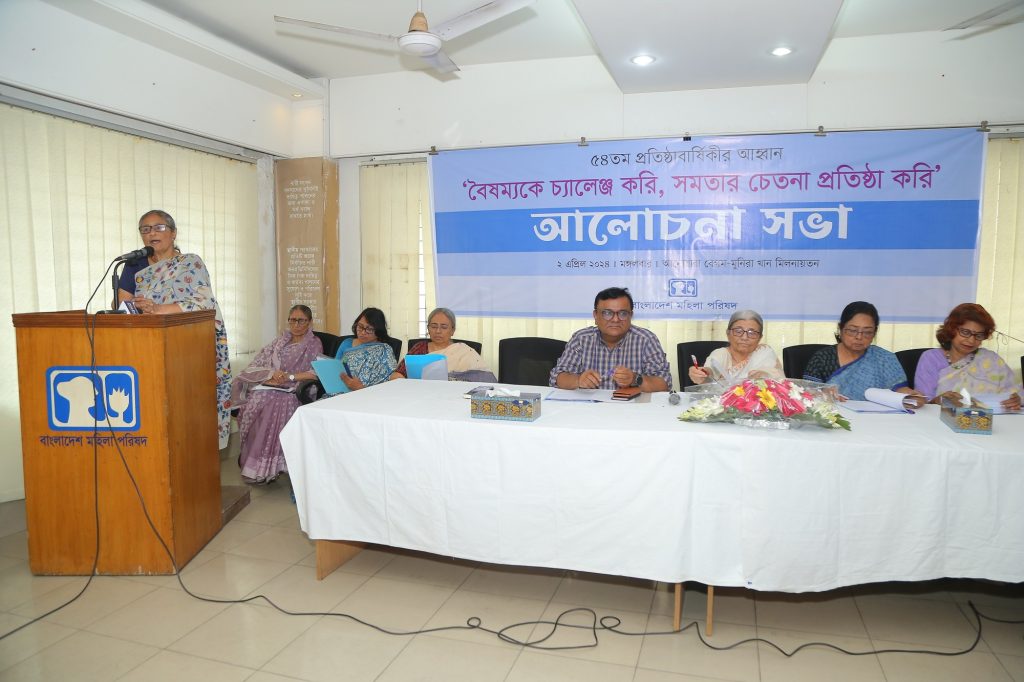
The event commenced with a musical performance by renowned singer, lecturer, department of Music, Jagannath University, Mridula Samaddar, followed by a poetry recitation by IT officer Dolan Krishna Shil.
It was emphasized that gender discrimination transcends mere women’s issues and is deeply ingrained in societal structures. While significant strides have been made in advancing women’s status in Bangladeshi society in 2024, numerous socio-cultural and familial obstacles, including violence, continue to impede the path to gender equality and empowerment. Against this backdrop, it was underscored that achieving Goal 5 of the Sustainable Development Goals (SDGs) by 2030, which aims to establish gender equality, requires a paradigm shift. It necessitates viewing women not merely as recipients of development but as active agents thereof, thereby catalyzing empowerment across all levels of society.
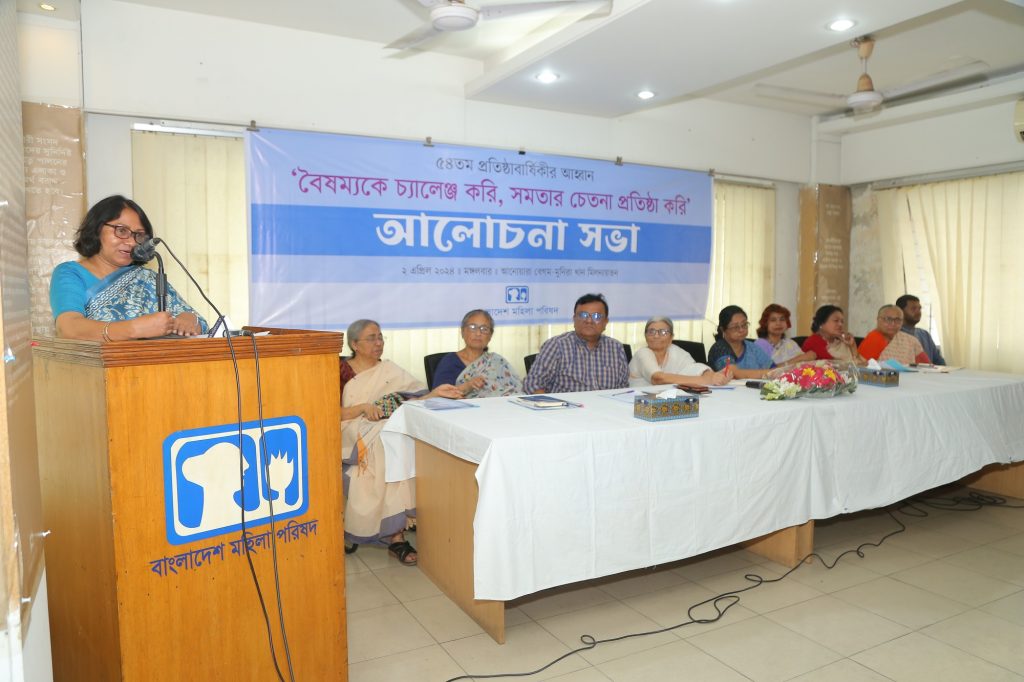
As a commentator, Adnan Mustari underscored the diverse facets of discrimination and emphasized the necessity of community involvement to achieve success in the broader women’s rights movement. He pointed out that the trajectory of development faces a new challenge with climate change, particularly impacting women in the southern region, who are disproportionately vulnerable to health risks stemming from salinity intrusion. Moreover, the burden of water collection disproportionately affects girls’ education, presenting new hurdles that demand collaborative efforts for resolution.
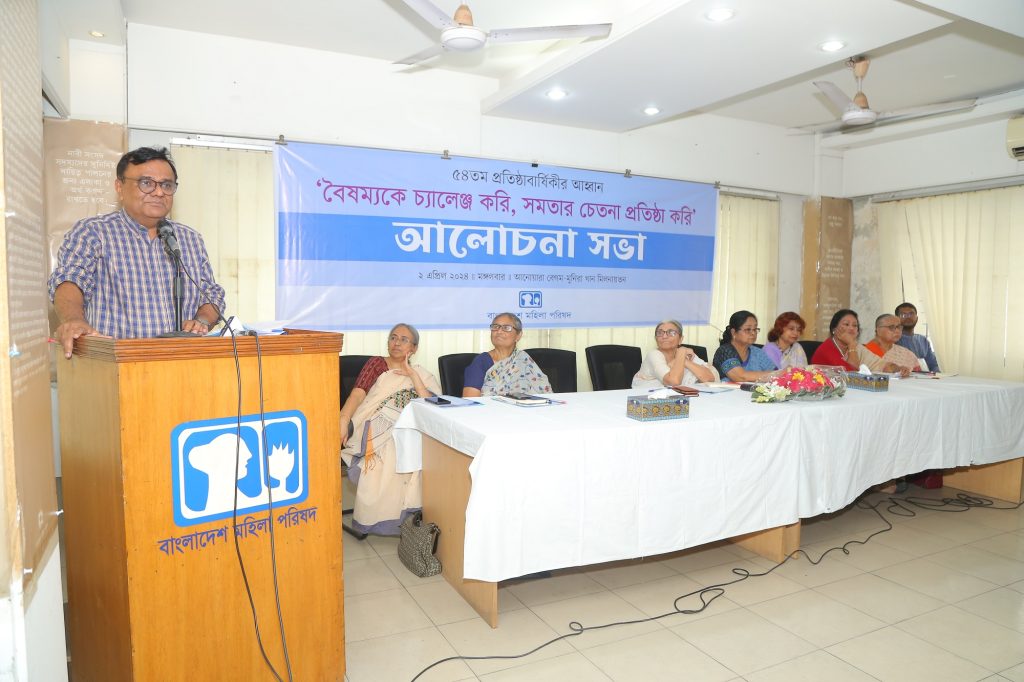
Shahanaaz Sumi articulated that gender discrimination transcends borders, affecting women globally. To combat this, she stressed the importance of collective action from all quarters to eradicate such biases.
Amidst the ongoing battle against inequality in Bangladesh, prominent figures have stepped forward to address the pressing issue of women’s empowerment. Syed Ishtiaq Reza, a vocal advocate for social justice, highlighted the persistent lack of supportive environments for women in educational institutions. Despite rhetoric advocating for women’s empowerment across various sectors, tangible progress remains elusive. Reza emphasized the urgent need to establish the principle that “inequality is a crime” at the heart of decision-making processes to effectively combat the systemic barriers hindering women’s advancement.
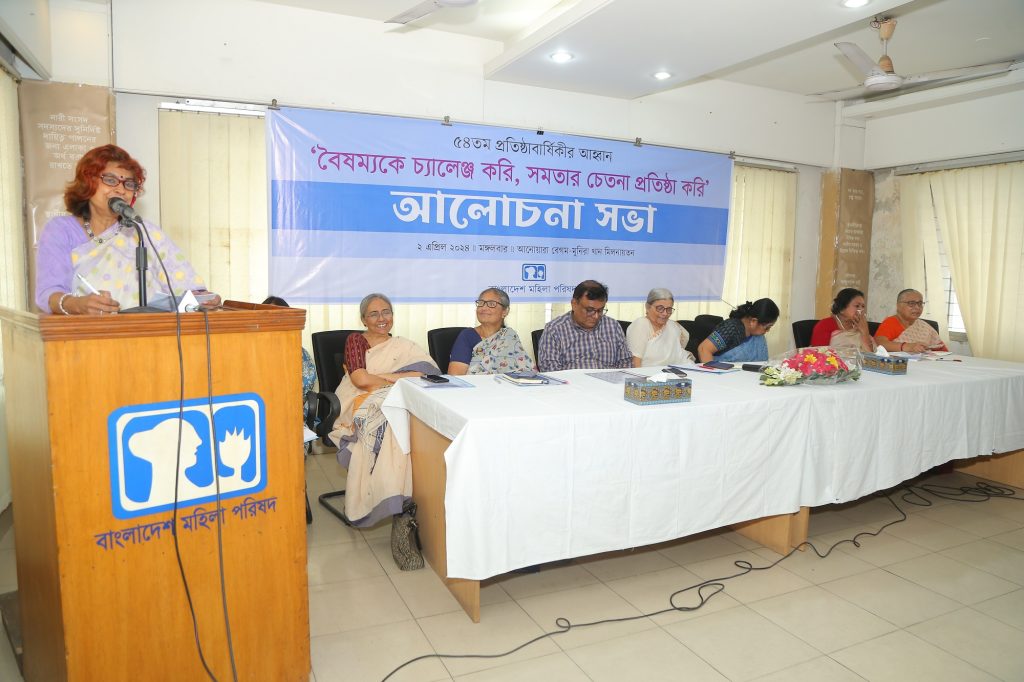
Echoing Reza’s sentiments, Advocate Salma Ali underscored the challenges of implementing laws aimed at preventing sexual harassment. While legislative measures exist, their enforcement often falls short, leaving women vulnerable. Ali stressed the importance of maintaining active women’s movements and providing legal professionals with essential technological training to bridge the gap between law and practice. Additionally, she urged the formal organization of women’s councils to bolster their influence in society.
Dr. Nasim Akhtar Hosain addressed a fundamental question: Can women truly advocate for themselves in contemporary society? She contended that this inquiry is intricately tied to the preservation of women’s individual, democratic, and political rights. Dr. Hosain emphasized the need to challenge prevailing norms, urging for initiatives that go beyond traditional boundaries to ensure the recognition of the economic contributions of women.
In a similar vein, Dr. Shayla Nasrin underscored the need for cultural evolution to address gender disparities. She posited that inequality between men and women is not innate but rather a product of societal constructs. Dr. Nasrin emphasized the importance of reshaping cultural norms to pave the way for genuine development. Prioritizing individual identity and guaranteeing equal property rights for all individuals, regardless of gender, are vital steps in this transformative journey.
In the inaugural speech, General Secretary Maleka Banu highlighted the pivotal role of organized women’s societies during the liberation war, leading to the formation of the Bangladesh Mahila Parishad. She urged the youth to leverage technology to build a society free from discrimination, emphasizing the need for women’s integration into national development through active participation in both global and national women’s movements. Despite the enactment of women-friendly laws, challenges persist in their implementation. She noted enduring inequality in social customs, exacerbated by a push towards conservatism under the guise of religiosity. Maleka Banu particularly underscored the pivotal role of the women’s movement in promoting inclusivity and driving social progress.
In her address, Dr. Fauzia Moslem, President of the Bangladesh Mahila Parishad (BMP), advocated for women’s rights and equality, reflecting on the organization’s journey spanning over half a century. Dr. Moslem highlights the evolving landscape of the women’s movement amidst advancements in knowledge and technology. However, she also drew attention to persistent human rights violations and the growing trend of self-centeredness in society, exacerbated by escalating climate crises. Emphasizing the increasing awareness of women’s rights, She underscored the importance of supporting women and addressing prevalent inequalities. She urged action to combat various forms of discrimination still prevalent in women’s lives. Furthermore, Dr. Fauzia Moslem called for the organization of courageous efforts within the women’s movement, integrating them into transformative processes aimed at establishing equality, justice, and dignity through inclusive actions.
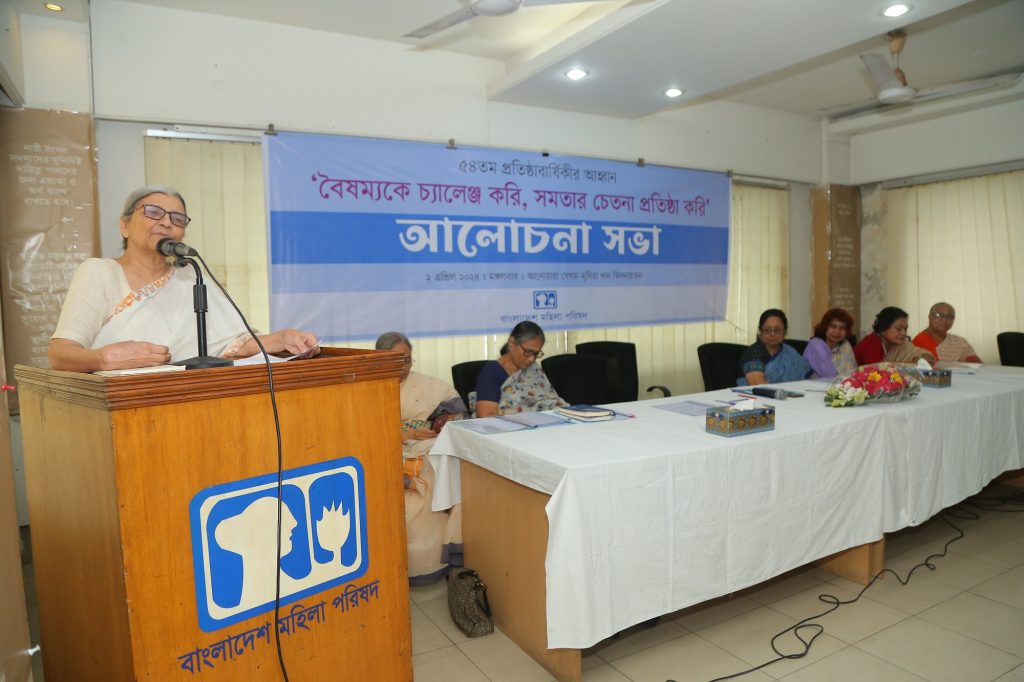
The central and Dhaka City Committee representitive, , staff, and representatives from print and electronic media were present at the event. Umme Salma Begum, Organizing Secretary of BMP conducted the program.
On April 4, 2024, the Bangladesh Mahila Parishad marked its 54th founding anniversary at its Sufia Kamal Bhavan, , Anwara Begum- Sufia Khan Audetorium in Dhaka. The ceremony began at 11:00 AM with Dr. Fauzia Moslem, president of BMP, raising the national flag. The organizations’s flag was raised by the General Secretary, Maleka Banu. This year’s theme “Confronting Discrimination, Fostering Equality Awareness,” emphasized the organization’s ongoing commitment to gender equality.
Following the flag-raising ceremony, a musical performance was presented by Uddichir’s dance and music secretary, Suraiya Parveen.
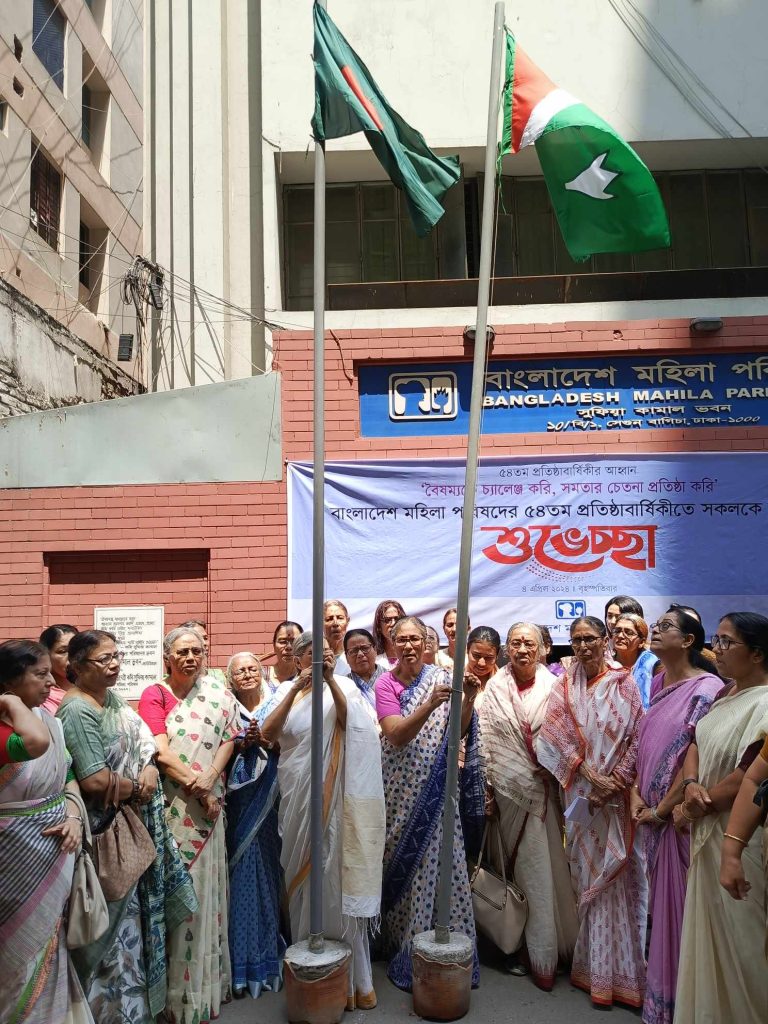
Organizing Secretary Umme Salma Begum conducted the program.

